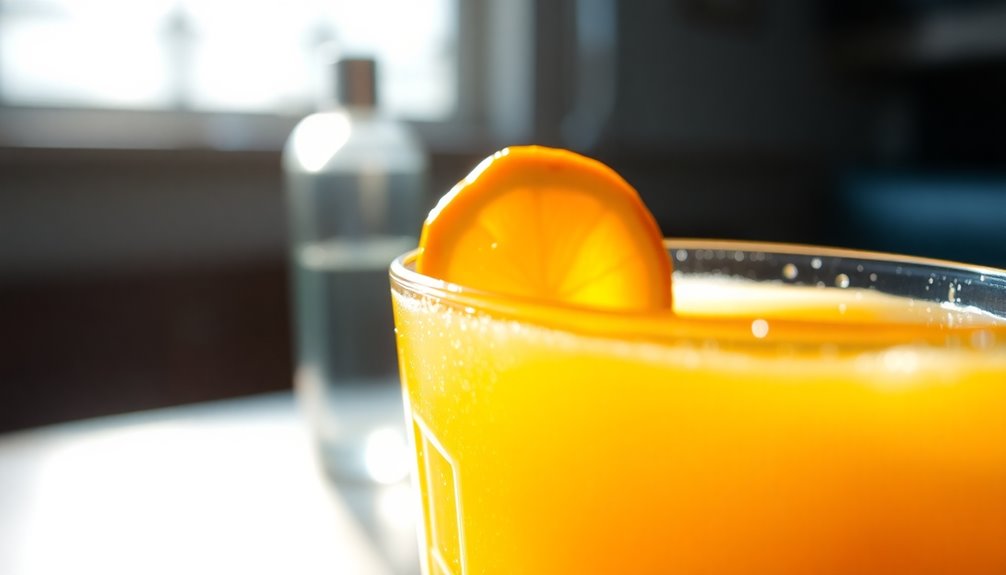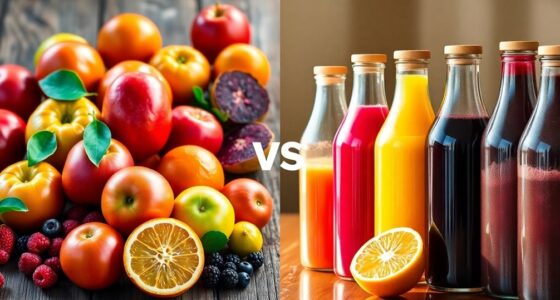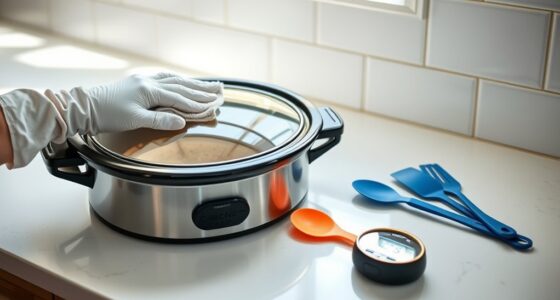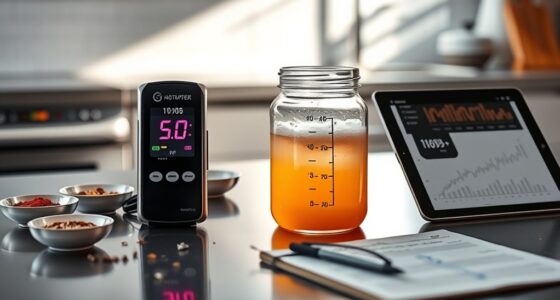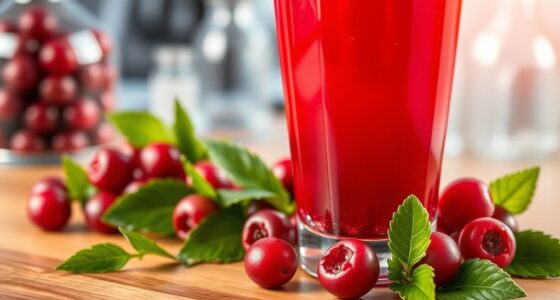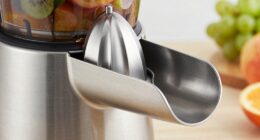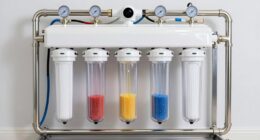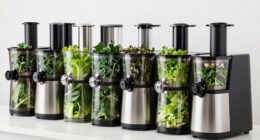You might be surprised to know that orange juice contains trace amounts of alcohol. Through natural fermentation, it can have ethanol levels ranging from 0.02% to 0.09% ABV. This means you're sipping on tiny alcohol content without even realizing it! While these levels are generally considered safe, they can still pose health risks for some individuals. If you're curious about the health implications and production processes, there's plenty more to uncover about your favorite juice.
Key Takeaways
- Orange juice typically contains trace amounts of alcohol, ranging from 0.02% to 0.09% ABV due to natural fermentation processes.
- Ethanol levels in orange juice vary, usually between 0.16 to 0.73 grams per liter, influenced by production and storage conditions.
- The FDA classifies beverages with less than 0.5% ABV as non-alcoholic, which includes most orange juice varieties.
- Natural fermentation can occur in orange juice, leading to unexpected alcohol content that may not be immediately noticeable.
- Caution is advised for individuals in recovery or with specific health concerns due to the presence of trace alcohol in orange juice.
Understanding Alcohol Content in Orange Juice

While you might think of orange juice as a completely non-alcoholic beverage, it actually contains trace amounts of alcohol due to natural fermentation processes.
Ethanol levels in orange juice typically range from 0. 16 to 0. 73 grams per liter. According to the FDA, beverages with less than 0. 5% alcohol by volume are considered non-alcoholic, so most orange juice fits this classification. Interestingly, grape juice usually has higher ethanol levels than orange juice. Some brands may also add vitamin D and calcium, which can provide additional health benefits along with the trace alcohol content. Furthermore, it’s important to note that the ethanol content in orange juice can vary based on factors such as fermentation processes and storage conditions. When considering how much juice from oranges is required to produce a glass of orange juice, it typically takes about three to four oranges to yield approximately 8 ounces of juice. This means that while the ethanol levels are generally low and within safe limits, the natural fermentation process can lead to varying levels of alcohol content in the final product.
Most consumers don't worry about these trace amounts, but it's important to note that factors like production methods, fermentation time, and storage conditions can influence alcohol content.
If you're aware of these elements, you can make informed choices about the juice you drink.
Natural Fermentation Processes Explained
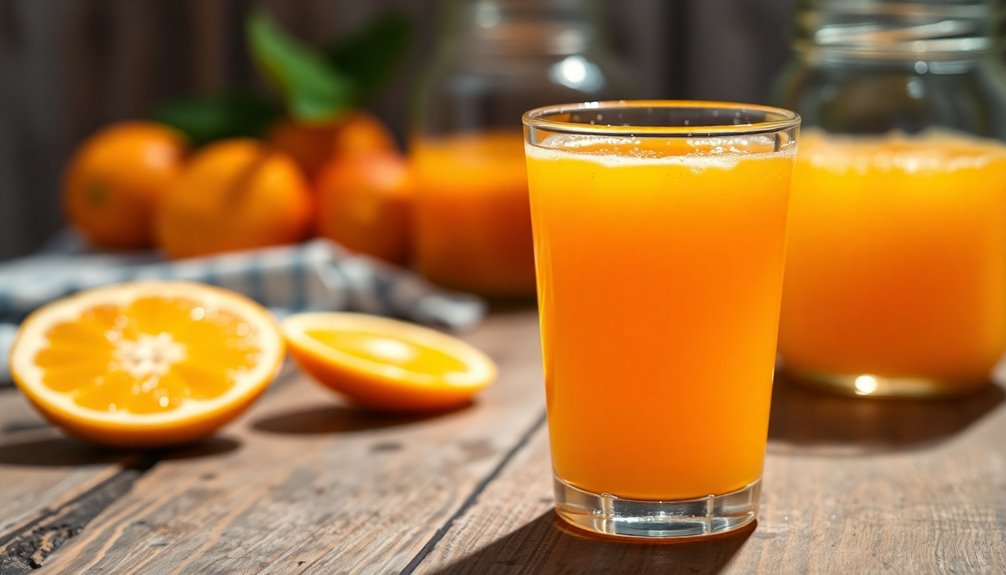
Fermentation is a fascinating biochemical process where microorganisms transform sugars into alcohols and acids, playing a crucial role in the production of various foods and beverages.
During fermentation, microbes act as catalysts, converting sugars into ethanol and carbon dioxide, often in anaerobic conditions. There are two main stages: primary and secondary fermentation. In the primary stage, microbes rapidly convert sugars while repelling harmful bacteria, creating initial products like alcohol. The secondary stage lasts longer, increasing alcohol content and developing complex flavors. This stage can last from days to weeks, and as alcohol levels rise, yeast eventually dies off, halting the fermentation process. Understanding these stages helps explain how even orange juice can contain trace amounts of alcohol. Additionally, the type of fermentation used can greatly impact the final product, as different microorganisms and conditions lead to distinct flavor profiles.
Nutritional Value of Orange Juice
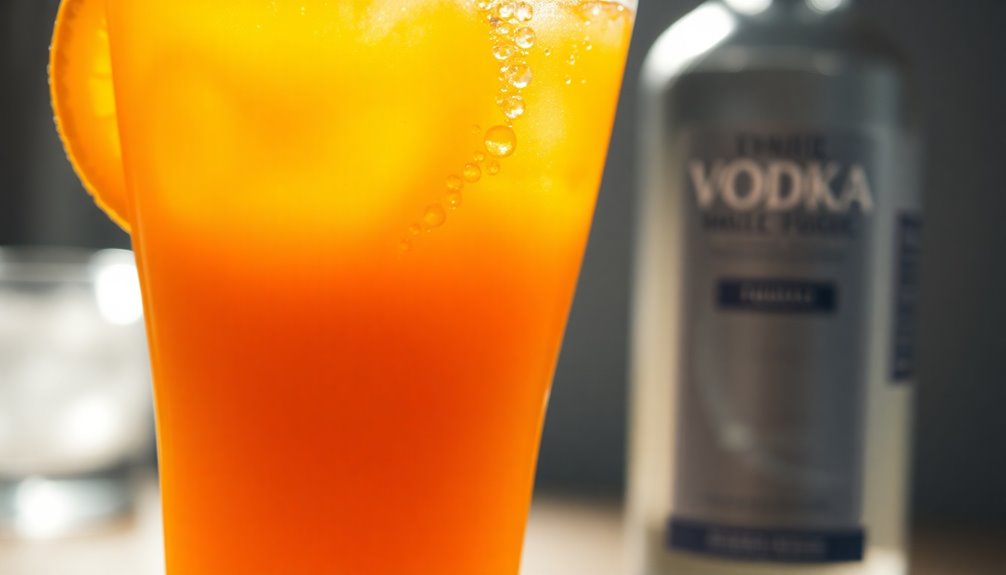
Understanding the natural fermentation processes in orange juice reveals more than just its alcohol content; it also highlights its nutritional benefits.
An 8-ounce serving packs around 110 calories, with 25.5 to 26 grams of carbohydrates and about 2 grams of protein. You'll find virtually no fat and just 0.5 grams of fiber.
Orange juice is a superstar when it comes to vitamin C, providing 67% to 137% of your daily recommended intake. It also offers folate, potassium, magnesium, and a bit of calcium. Additionally, processing and storage can lead to a reduction in antioxidant activity, which is important for fighting oxidative damage. Consuming orange juice may also enhance digestion due to its vitamin content.
Plus, antioxidants like flavonoids and carotenoids help combat oxidative damage, potentially lowering the risk of chronic diseases.
While it has more sugar than whole oranges, its nutrient profile makes it a valuable addition to your diet.
The Role of Pasteurization in Juice Production

Pasteurization plays a critical role in juice production by ensuring the safety and longevity of the product. This heat treatment process kills harmful bacteria, viruses, and other microorganisms, significantly reducing the risk of foodborne illnesses. Typically performed at temperatures between 85°C and 98°C for 15-30 seconds, pasteurization extends juice shelf life by minimizing spoilage. Methods like flash pasteurization and high-pressure processing (HPP) are common, with HPP preserving better color and nutrition. During pasteurization, juice is preheated to about 55°C, then quickly heated and cooled to maintain quality. High acidity during pasteurization helps inhibit the growth of heat-resistant bacillus, further enhancing the safety of the juice. It's essential for compliance with food safety regulations, especially for vulnerable populations like children and the elderly. Without it, the safety and quality of your juice would be compromised.
Health Implications of Trace Alcohol Consumption
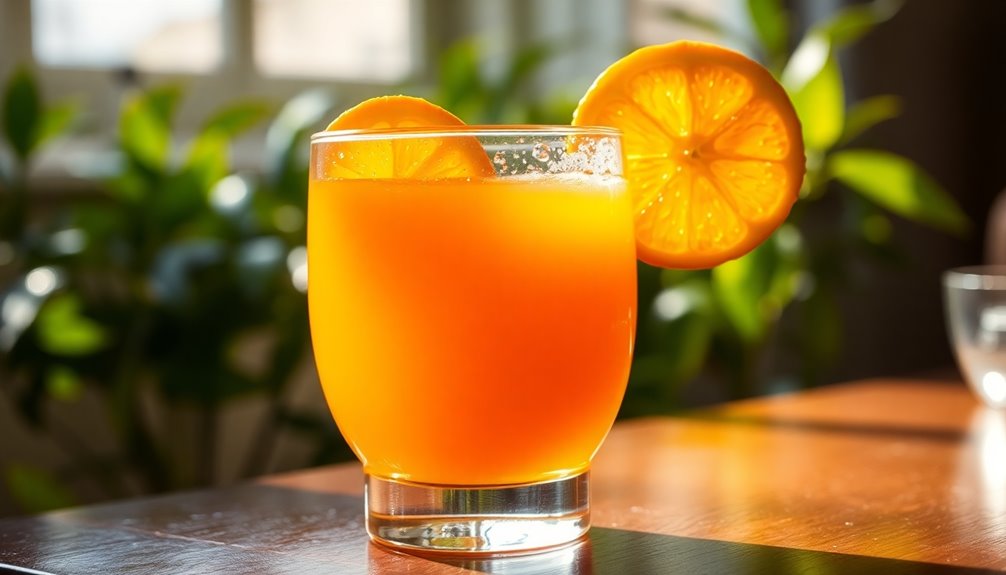
While many people enjoy a splash of orange juice with their breakfast, it's essential to consider the health implications of trace alcohol that may be present in some juice products.
Even small amounts of alcohol can contribute to health risks. For instance, regular consumption might elevate your chances of certain cancers, including breast and liver cancer. It can also impact your cardiovascular health, leading to high blood pressure and heart issues. Heavy drinking can cause liver disease, which may be exacerbated by trace alcohol in beverages.
Additionally, trace alcohol could interfere with your liver function and nutrient absorption, potentially causing malnutrition. If you have diabetes, be cautious, as alcohol can disrupt blood sugar control.
Ultimately, being aware of what's in your juice can help you make healthier choices for your well-being.
Regulatory Standards for Fruit Juices
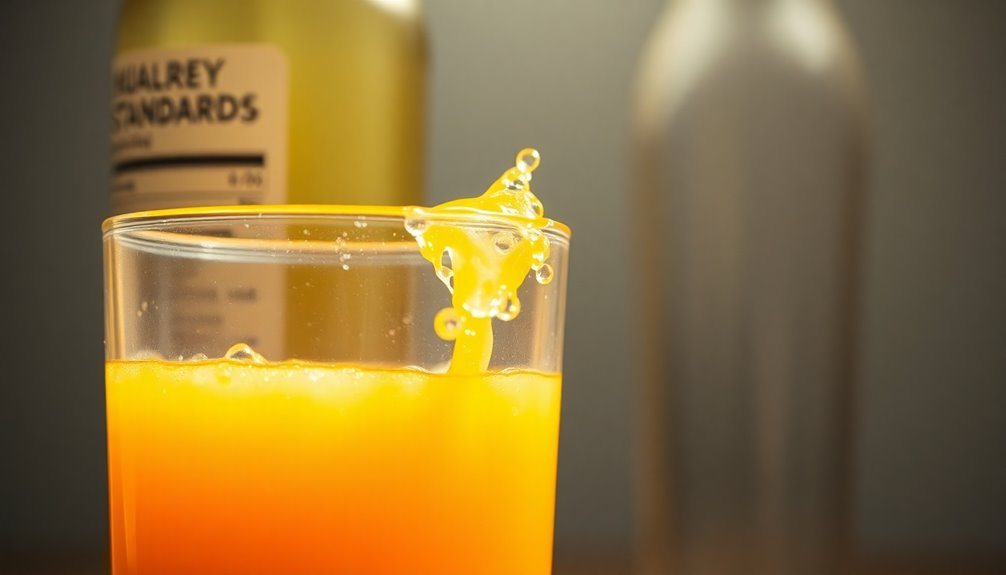
When it comes to fruit juices, regulatory standards play a crucial role in ensuring you receive safe and high-quality products. The FDA enforces food safety, mandating Good Manufacturing Practices (GMP) and proper labeling, which includes ingredients and nutritional info. However, alcohol content isn't listed unless it surpasses certain levels. Additionally, regulations limit artificial flavorings and preservatives to maintain product integrity. In the United States, the production of fruit wine is regulated to ensure compliance with specified solids and volume limitations. Internationally, standards vary; for instance, the EU exempts beverages over 1.2% ABV from ingredient disclosures. Compliance is strictly enforced through inspections and legal actions against violators, ensuring you'll enjoy juice that's not just tasty but also safe from harmful contaminants and misleading labels.
Comparing Alcohol Content in Different Juices

Orange juice typically has an alcohol by volume (ABV) of 0.02-0.09%, which puts it in a similar range to apple juice, with 0.008-0.08% ABV. Grape juice, however, can be slightly stronger, containing 0.04-0.11% ABV. Despite these differences, all these juices have low alcohol levels that are generally considered safe. It's essential to remember that factors like fermentation and exposure to air can influence these numbers. While you mightn't feel the effects of this minimal alcohol, it's still good to be aware, especially if you're serving juice to children. This is largely due to the fact that alcoholic content varies even among non-alcoholic beverages.
The Impact of Fermented Orange Juice on Recovery
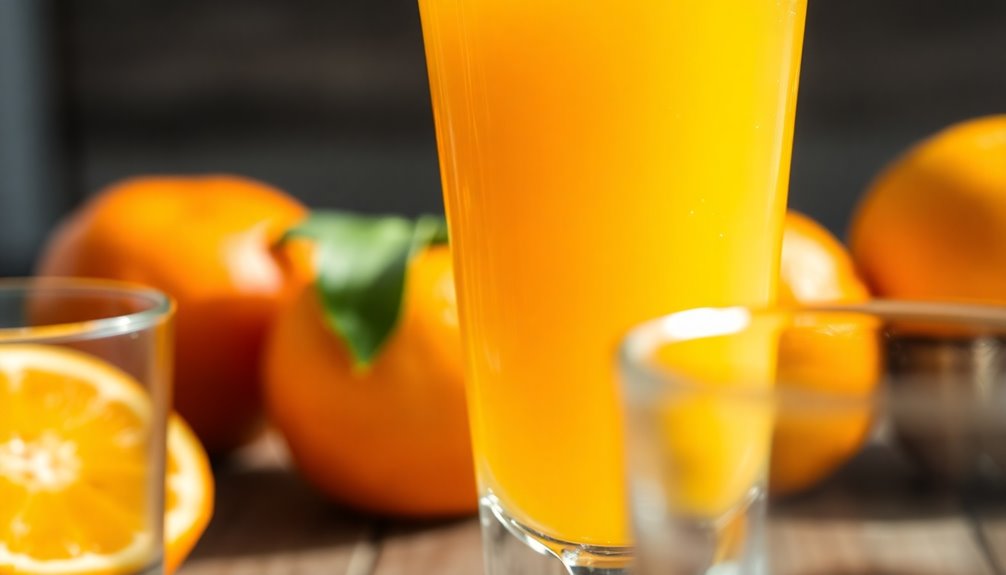
Fermented orange juice can pose unexpected challenges for those in recovery from alcohol addiction, as even small amounts of alcohol may trigger cravings.
Natural fermentation can occur, often unnoticed, leading to subtle alcohol content that varies based on sugar levels and storage conditions. If you notice a sour smell or bubbles, it's a sign that fermentation has happened. During fermentation, the presence of natural yeast can significantly influence the alcohol content, which may not be immediately apparent.
Individual sensitivity to alcohol plays a significant role, so it's essential to assess your personal risk factors before consuming any juice. Many in recovery choose to avoid fermented juice altogether to prevent relapse.
Having a strong support system can also help you navigate these risks, ensuring you stay on track while managing temptations that may arise from seemingly innocent beverages.
Enjoying Orange Juice Responsibly
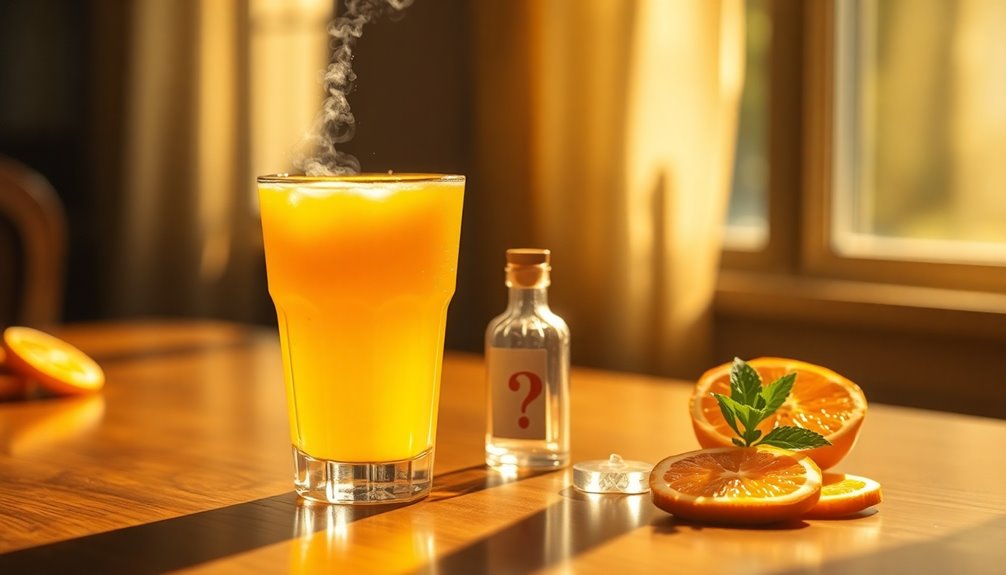
Although orange juice is a staple in many diets, enjoying it responsibly requires awareness of its potential alcohol content. The trace amounts of alcohol, ranging from 0.02% to 0.09% ABV, result from natural fermentation processes.
While this level is generally considered safe and doesn't lead to intoxication, it's wise to moderate your consumption, especially due to its high sugar content. Pregnant women and children should be particularly cautious about any alcohol exposure.
Additionally, as orange juice is often enjoyed at family gatherings, being informed about its alcohol content helps ensure responsible serving. Furthermore, it's essential to remember that natural fermentation processes can also occur in other food items, leading to similar trace alcohol levels.
Frequently Asked Questions
Can Children Safely Consume Orange Juice With Trace Alcohol?
Yes, children can safely consume orange juice with trace alcohol.
The alcohol content is very low, typically between 0.02% and 0.09% ABV, and it's a result of natural fermentation. This amount isn't enough to cause intoxication or health issues.
While it's important to educate children about alcohol, you don't need to worry about their occasional consumption of orange juice.
It's recognized as safe by health authorities, so you can feel confident in serving it.
Does Cooking or Heating Orange Juice Affect Its Alcohol Content?
Heating orange juice is like trying to chase away shadows with a flashlight—while it can alter some aspects, it doesn't necessarily increase alcohol content.
Cooking doesn't promote fermentation; in fact, it can kill off natural yeasts that produce alcohol. If fermentation's already happened, heating mightn't reduce the alcohol significantly.
Is Alcohol in Orange Juice Detectable by Breathalyzers?
Yes, alcohol in orange juice can be detectable by breathalyzers, but the amounts are usually minimal.
If you've recently consumed orange juice, it might lead to a false positive due to trace alcohol content.
Breathalyzers measure the alcohol in your breath, and any mouth alcohol can skew results.
To avoid inaccuracies, it's wise to wait a bit after eating or drinking before taking a breath test.
Always be cautious of potential influences on breathalyzer readings.
How Long Does Orange Juice Need to Ferment to Increase Alcohol Content?
To increase the alcohol content in orange juice, you'll need to ferment it for at least 48 hours. During this time, yeast converts the sugars into alcohol.
If you want a higher alcohol level, extending the fermentation can produce up to 14% ABV. Using specific yeast strains and adding more sugar can also boost the alcohol content.
Just remember, maintaining the right temperature and pH is crucial for successful fermentation.
Are There Specific Brands With Higher Alcohol Content in Orange Juice?
You won't find any specific brands of orange juice with higher alcohol content because traditional orange juice is non-fermented.
Most brands focus on quality and freshness, ensuring their products contain no alcohol.
If you're looking for a refreshing drink, stick to options like Tropicana or Simply Orange, known for their natural ingredients and great taste.
Just remember, if you're after alcohol, you'll need to explore other beverages entirely!
Conclusion
So, next time you enjoy a glass of orange juice, remember that it might contain a tiny bit of alcohol due to natural fermentation. For example, a recent study found that some brands had trace amounts equivalent to a non-alcoholic beer. While it’s not enough to make you tipsy, being aware of this can help you make informed choices, especially if you’re watching your intake. Enjoy your juice responsibly and savor every sip! Always check for any changes in taste or odor that might indicate spoilage, as quality matters just as much as the alcohol content. Similarly, if you’re using an electronic device like a vape, knowing how to tell if your elf bar is dead can help you avoid unexpected moments when you’re looking to enjoy some leisure time. Keeping these small details in mind can significantly enhance your overall experience, whether sipping on juice or using a vape.
Cindy thoroughly researches juicing trends, techniques, and recipes to provide readers with practical advice and inspiration. Her writing style is accessible, engaging, and designed to make complex concepts easy to understand. Cindy’s dedication to promoting the advantages of juicing shines through her work, empowering readers to make positive changes in their lives through the simple act of juicing.

